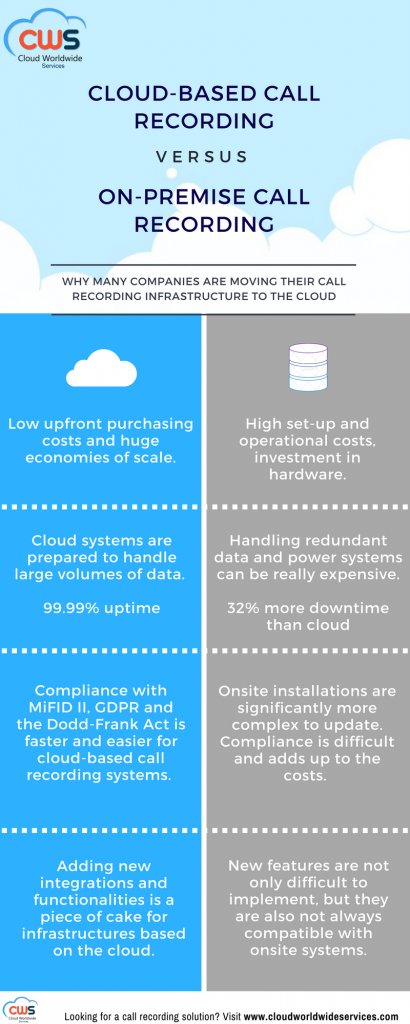With significantly lower costs, quick set-up and unlimited usability, cloud-based technology has been slowly substituting on-premise over the course of the last few years. However, despite the increasing number of businesses moving to the cloud, a huge percentage of call recording deployments are still relying on physical infrastructures. In this article, we will take a look at the differences between call recording on cloud vs. on-premise:
Upfront purchasing costs
On-premise: in the majority of the cases, the costs to set-up an on-premise call recording infrastructure can be really high. This includes the purchase of hardware, such as servers and computers, licensing, recurring operational costs, and infrastructure renewal each couple of years due to obsoletion.
Cloud: undoubtedly, one of the biggest benefits of call recording on cloud is that there is little to no investment in hardware or complex infrastructures. In fact, ongoing costs are limited to monthly subscriptions and/or use of the service (depending on the provider), and they are significantly lower than on-premise.
Maintenance
On-premise: onsite installations require regular hardware and software maintenance to ensure that the whole infrastructure is in line with the latest technological and security updates. Because this setup is quite complex, it usually requires for a qualified personnel, which can easily add up to the ongoing costs.
Cloud: moving your call recording system to a cloud-based provider means that you will no longer have to support and maintain a complex infrastructure by yourself. Because servers now belong to a trustworthy provider, they will be in charge of the upkeep, and you can focus this time and resources on more important things.
Reliability
On-premise: reliability is among the major concerns for many businesses. Is the system going to be available when you need it? Redundant data and power system can become really expensive, and not all on-premise infrastructures are prepared to handle them.
In fact, a survey conducted by Nucleus Research discovered that companies experience 32% more downtime on onsite infrastructures than on cloud.
Cloud: cloud systems, on another hand, are prepared to handle huge volumes of data, delivering a high quality of redundancy protection. Downtime is significantly less frequent on cloud than on-premise – for example, our cloud-based call recording solution Recordia has a 99.99% of uptime on our service level.
Security
On-premise: many companies still believe in the myth that call recording on-premise is more secure than call recording on cloud. However, onsite infrastructures not only experience many breaches as a result from human error or malicious practices, but they are also more difficult and expensive to update to the latest security measures.
Because this often translates to additional costs, a lot of businesses do not update regularly, facing risks for security breaches that could have been avoided.
Cloud: cloud infrastructures provide security in many different ways: via AES-256 algorithms, encryption, protection against DDoS attacks, and disaster recovery, among others.
Additionally, updates made by cloud providers impose no costs on their clients, and are easy to implement. This allows companies to stay ahead of security threats without additional costs.
Features & Integrations
On-premise: adding new features or integration alternatives are not only costly for onsite infrastructures, but they can also take a long time to be implemented while remaining compatible with the system.
Cloud: as opposed to on-premise systems, cloud-based services can equipped quickly and easily with new features and integrations. For example, Cloud Worldwide Services is constantly adding new functionalities to its cloud-based call recording solution Recordia, such as Speech Analytics and Machine Learning technology.
Compliance
With the implementation of directives such as MiFID II, GDPR, and the Dodd-Frank act, call centers and other companies (especially the ones in the finance sector) became obligated to record calls in strict compliance with the security regulations. This means that their call recording software providers must comply as well.
On-premise: as we already mentioned, onsite infrastructures are significantly more complex and expensive to upgrade. Considering that only the compliance with MiFID II and GDPR can reach hundreds of thousands of dollars, it becomes even more expensive to do it by yourself.
Cloud: cloud-based service providers such as Cloud Worldwide Services offer call recording solutions in compliance with MiFID II, GDPR, and the Dodd-Frank Act, amount other regulations. Because upgrades are faster and easier on the cloud, it means that your call recording infrastructure will always be up to date with the latest modifications in the regulations.
Looking for Call Recording on Cloud?
If you are looking for a cloud-based call recording solution that captures, encrypts, records and stores communications in compliance with security regulations, talk to one of our representatives today.


